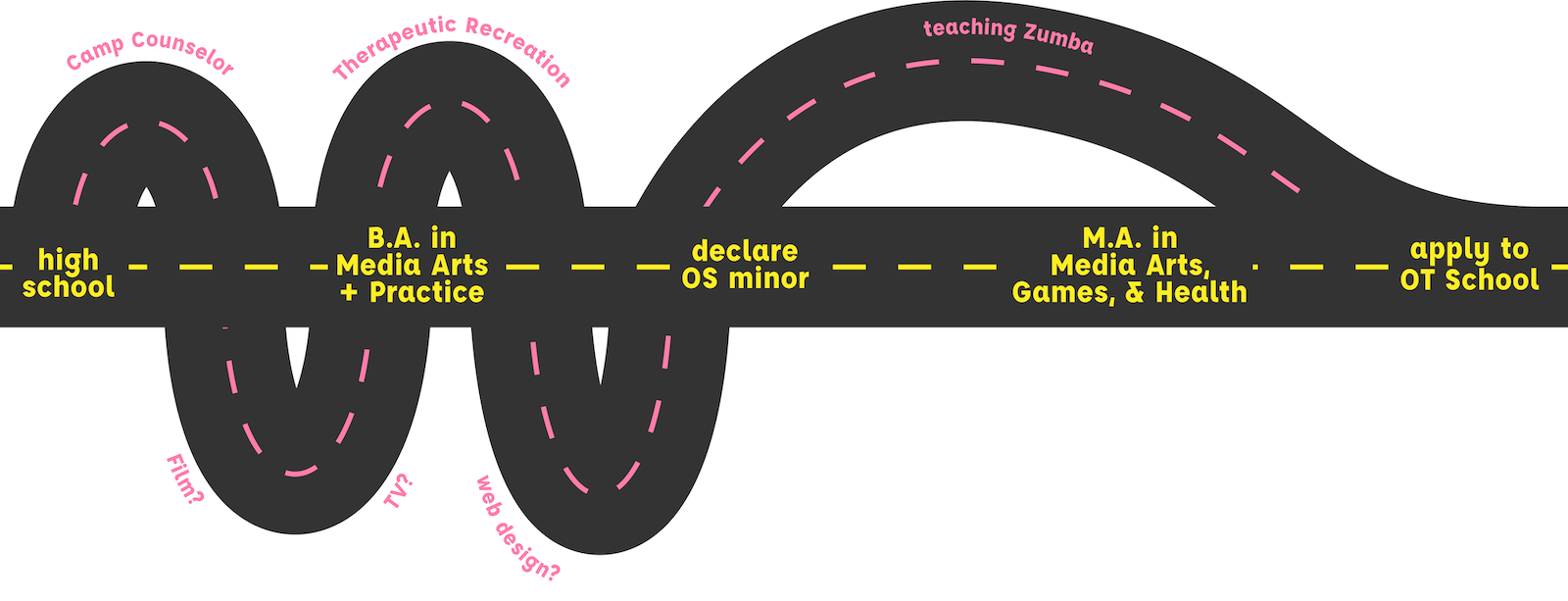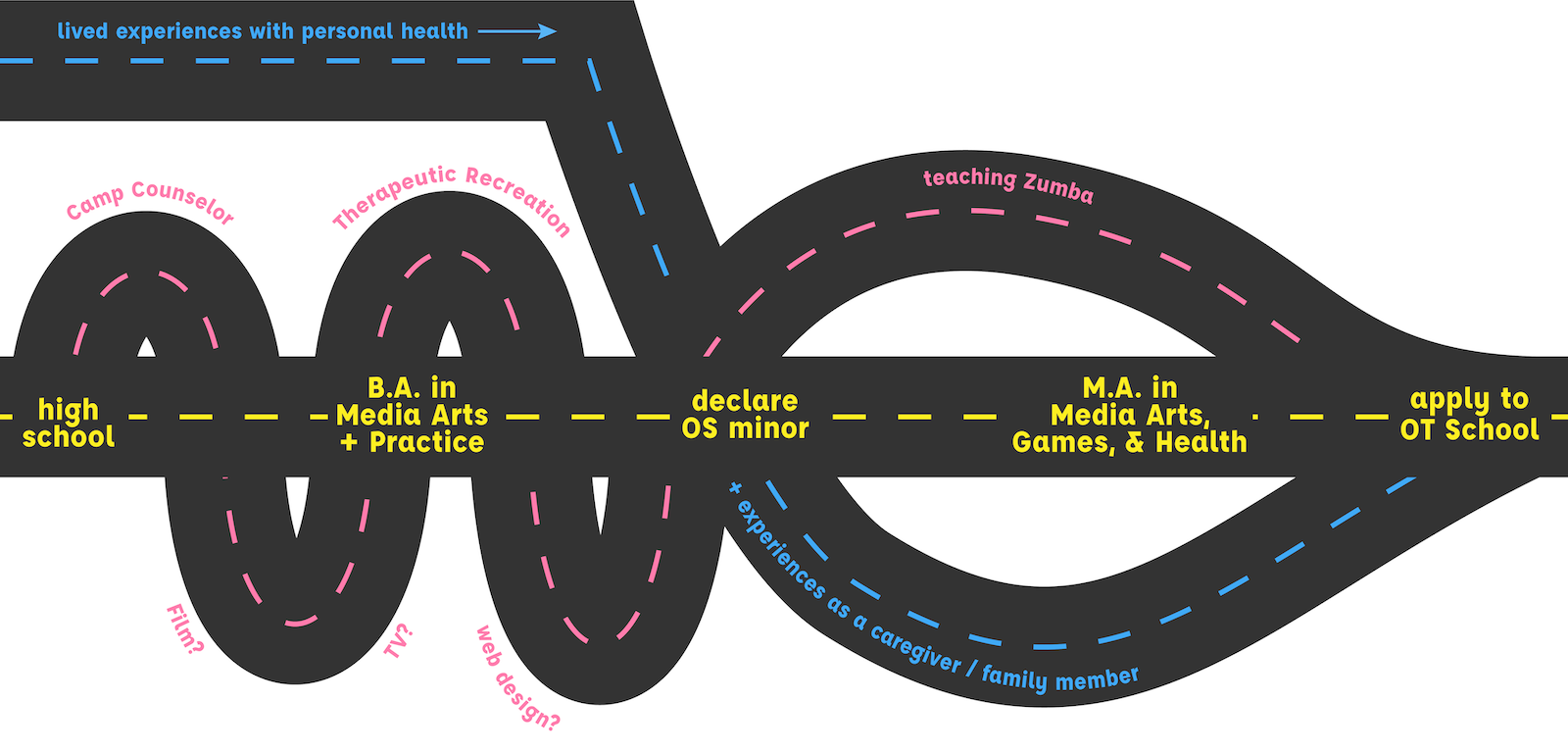Student Blog
What are OS/OT?
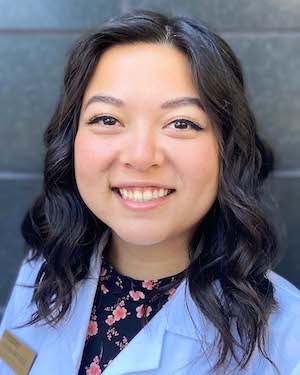
A Love Letter to the OS Minor ⟩
October 27, 2021, by Alyssa
Classes What are OS/OT?
With USC course registration coming up, let’s chat about the occupational science (OS) minor and why it’s the best dang minor ever (Let’s be real — it’s part of my job to promote our programs . . . but I promise this is my honest opinion and I’d say all of this for free).
Undergrad was a very stressful time for me. My major courses involved many overlapping creatively-demanding projects, and I spent plenty of late nights glued to my computer to keep up with it all. For me, and for many others, the OS minor was a refuge. Beyond their obvious application to OT school and life in general, I thought they were all really fun and often were a stress-free few hours of my week. AND I actually remember what I learned in them. Here’s what I took & my favorite project from each class:
OT 250 (4 units): Introduction to Occupational Science and Occupational Therapy
- What is it? The only class required for the minor. It was like a sampler of everything OT has to offer — we learned about healthy habits and routines, flow, motivational interviewing, lifestyle redesign, OS research, neuroscience, stress management, sleep hygiene, creativity, exercise, sensory systems, and (still somehow) more!
- My favorite project: We wrote a paper to reflect on occupations that bring us into a flow state — I wrote mine about Zumba. 💃
OT 251 (4 units): Across the Lifespan: Occupations, Health and Disability*
- What is it? The OT department’s lifespan development class. This class was great preparation for the Team-Based Learning format used in several of the OT graduate classes. *(Bonus: it covers a prerequisite for the graduate program so it’s like a 2-for-1 deal.)
- My favorite project: Individually, our final assignment was to read a memoir by a person with a disability and relate it to the course — I applied the person-environment-occupation model to Tara Westover’s Educated and it was the first time I got to practice this kind of analysis.
OT 330 (4 units): Perspectives on the Daily Life of Families
- What is it? A class dedicated to the roles within and occupational impact of family life.
- My favorite project: A family tree diagram to identify occupational connections within our families. We could make it as extensive as we wanted, and I had a blast. My final tree was 23 pages wide 😮
OT 350 (4 units): Disability, Occupation, and the Health Care System
- What is it? Amazing guest speakers and meaningful discussions surrounding the varied experiences of living with a disability and navigating the health care system.
- My favorite project: We had weekly journals to reflect on our developing understanding of disability — my favorite journal activity was an accessibility scavenger hunt around USC’s main campus.
OT 370 (4 units): Understanding Autism: Participation Across the Lifespan
- What is it? This class was so different from psychology classes I had taken that included content about ASD. We focused on neurodiversity, lived experiences, and advocacy.
- My favorite project: My ‘media representation of ASD’ group project. I got to illustrate a children’s book and explore ways to help typically developing children understand their peers with ASD.
If I could have fit more in my schedule, I would have. Specifically, the human-animal interaction class. A few weeks ago, my friend’s dog was a guest speaker in that class — he was excellent.
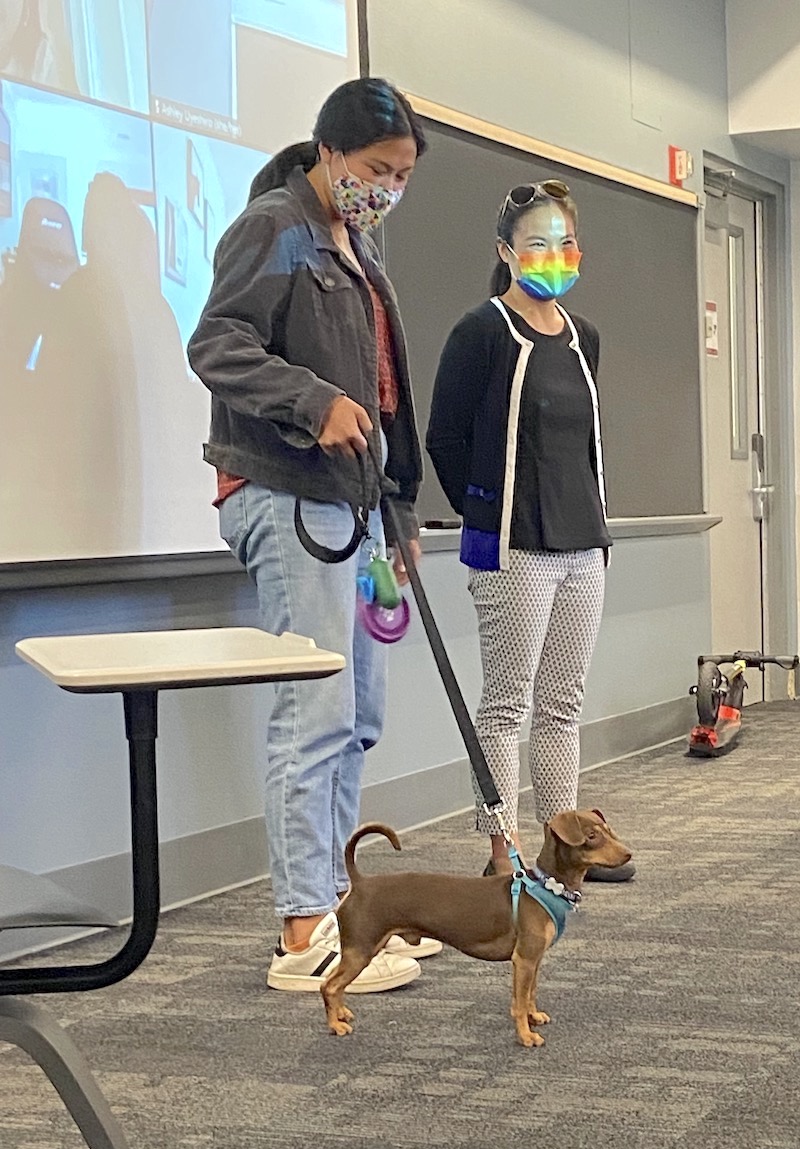
Dr. Ashley Uyeshiro Simon and guest speakers Samantha Kosai (human) and Oliver Kosai (small dog). The start of Ollie’s long career in academia, I’m sure.
As a student ambassador, I recently got to go back and give brief presentations to some of this semester’s OS minor courses, and it made me really nostalgic. When I feel nostalgic, I get emotional. When I get emotional, I write letters and never send them (usually because they are addressed to real people. Since this one is addressed to a non-sentient academic program, I’m ok with publishing it on the internet. So, here we go).
To my beloved OS minor,
I wish we could have spent more time together. I miss a lot about being an undergrad at USC, and your classes are no exception.
Thank you for classes that brightened my afternoons when I’d usually be needing a nap. Thank you for faculty mentors who have supported me through ups and downs both academically and personally (shout-outs to Linsey, Kate, & Kristy). Thank you for literally assigning some of my closest friends, Leah and Dakotah, to me as part of my group for OT 251 — they’ve stuck with me all the way til the MA-II program, and now they’re stuck with me for life.
Thank you for guiding me into the best career in the world.
✌️
Alyssa
⋯
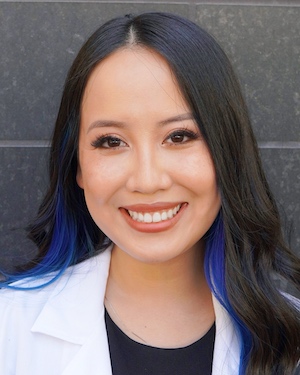
The Giving T(e)ree(sa) ⟩
October 25, 2021, by Teresa
Classes Life Hacks What are OS/OT?
Heyyy, besties! So the moment we enter Q4 on October 1, I start thinking about giving season because not to brag, buuut . . . I take a lot of pride in that (I believe) I give fantastic gifts. Whether big or small, I always try to make sure my gifts show people I was really listening to them when they shared with me that they’ve been wanting “X” or are really into “Y.” My top love languages are “quality time” and “physical touch” so you can imagine how much ya’ girl struggled throughout the pandemic, I’m not going to lie. But “gifts” became a welcome . . . well, gift.
In OT 405: “Foundations of Occupation” last summer with Dr. Halle, we learned that occupational therapy is rooted in the Arts and Crafts Movement but that our OT-founding queen pointed out that “handiwork alone was insufficient” (Slagle, 1930, p. 271). Then in the 1961 Eleanor Clarke Slagle Lecture, Dr. Mary Reilly shared the famous quote, “[Wo]Man through the use of [her] hands as they are energized by mind and will, can influence the state of [her] own health” (Reilly, 1963, p. 2). I know, I know — what is this, another lecture? But these things really stuck with me because it gave a definition to the calmness and serenity I had felt my entire life when crafting.
Over the past year, one of my favorite occupations has quickly become making things with my Cricut and I just feel the need to clear the air because whenever I say this, people are like “. . . 🦗???” Okay, NO — it’s a machine that can make intricate cuts on paper, cardstock, vinyl, etc., and allows you to make your own personalized crafts.
It just so happens that in OT 405 last summer, I was placed in the same group with Alyssa Matlosz, who’d become my fellow student ambassador and more importantly, one of my closest friends in the program. She was the first facilitator for our group and in relation to her week’s topic of Progressive Era Influences on the founding of occupational therapy, she ended with “I’m just like my country — I’m young, scrappy, and hungry — and I’m not throwin’ away my shot” and I thought . . . Did we just become best friends?
So it only made sense that on her birthday this year, after a year’s worth of iconic Zoom moments . . .
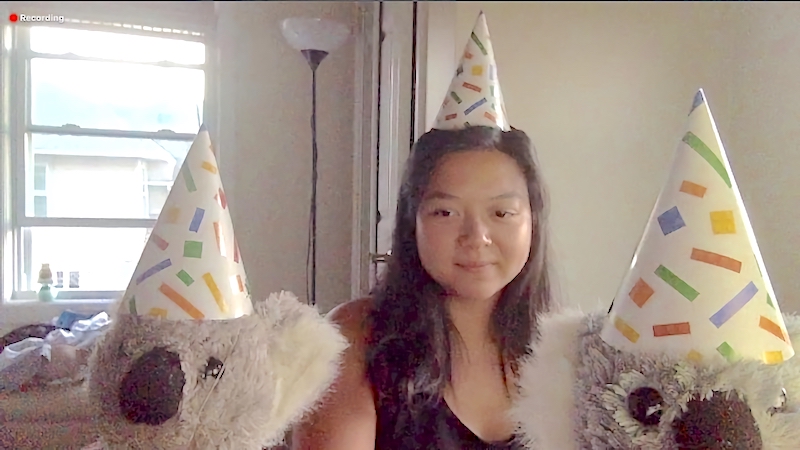
I truly do not even know how to begin to explain this, so please take it for what it is
. . . That I’d circle back to OT 405 and our shared love of “Hamilton: An American Musical” — a nod to the foundations of our friendship.
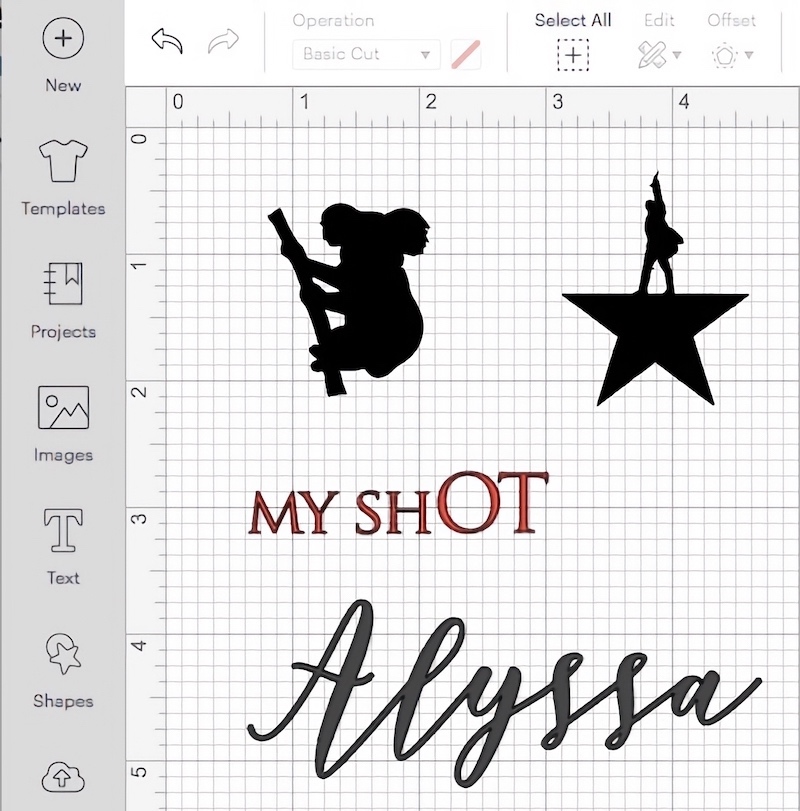
The designs I created on the Cricut Design Space app
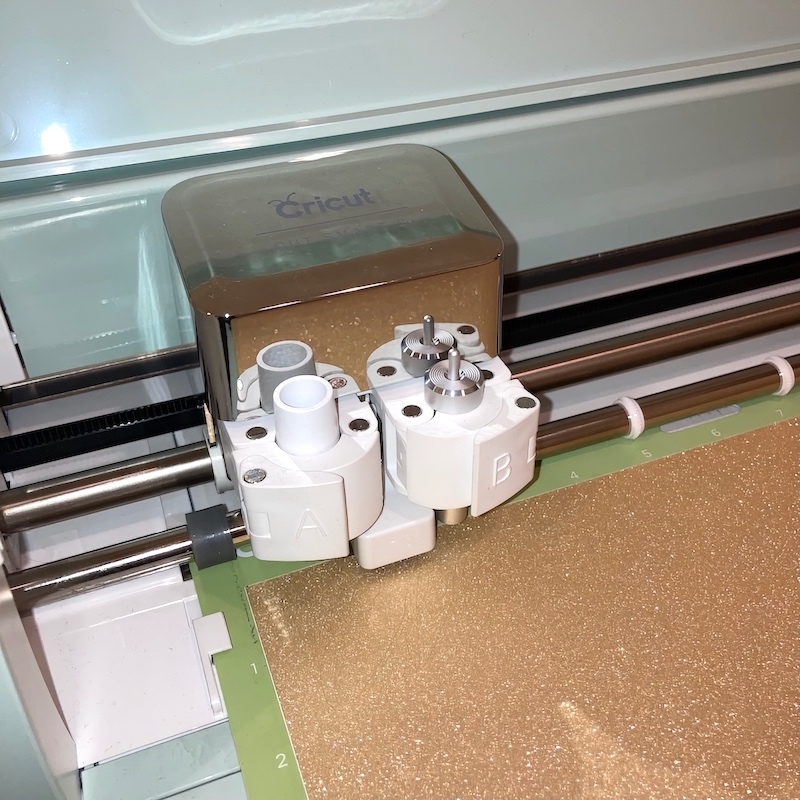
I selected the vinyl material I wanted to use, I arranged it to the cutting mat, I arranged it into the Cricut. (I arranged the menu, the venue, the seating!)
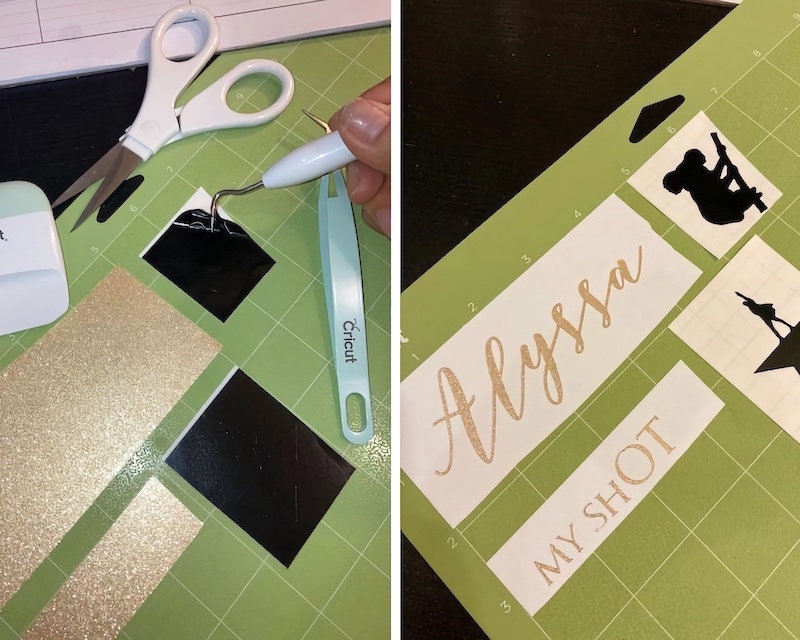
Left: This process is called “weeding,” where you extract the cut by removing the excess vinyl. Right: The finished vinyl cuts ready to be transferred onto the surface I choose using transfer tape!
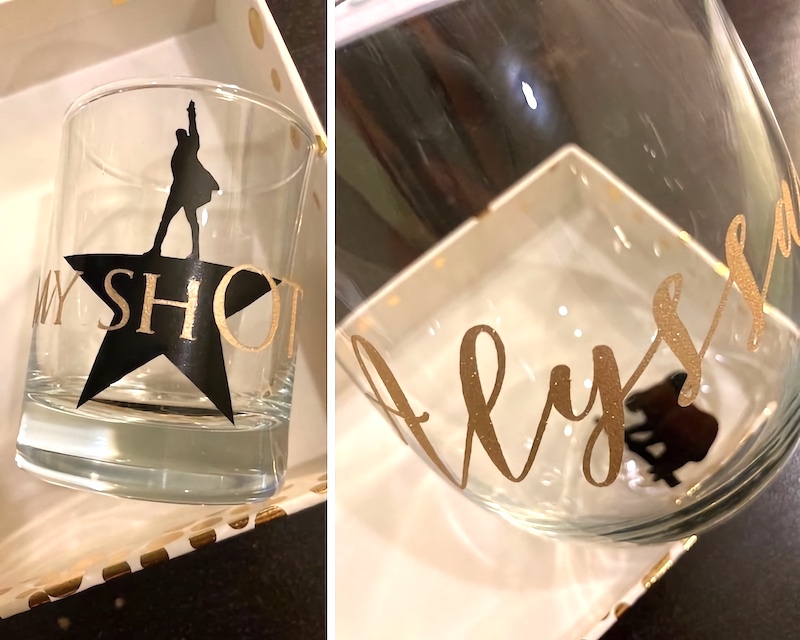
Left: Honestly, I’m pretty proud of this. Please, no one ever throw away their (sh)OT. Right: Lights are overrated, there should be a koala at the end of every tunnel.
I made these gifts during a week that, truthfully, I did not have time for. In between assignments, exams, deadlines, and applications, I was feeling overwhelmed and to be completely honest, I couldn’t remember the last time I had done something unrelated to school. So instead, I took a break and powered up the old ‘Cut. Something I really enjoy about the therapeutic process of crafting is that not too long ago, you just had a concept you were brainstorming in your head and now it’s a tangible, real thing you brought to life. I’m not just talking about physical items you create with your hands, either. You can “craft” anything — an essay you wrote last week that you’re really proud of, a flyer you made online to promote an event, a photo you captured to add to your carefully curated Instagram post, a blog you’re writing about what everyone initially thought was your love for insects. You took an abstract idea and introduced it into the world and if your mind can do that, think of all the things you’re going to do in the future. What a wonderful gift for this world to look forward to — the promise and hope of the products of your creativity and ingenuity that are yet to come.
There is also something beautiful to be said about an item you make with your hands. I spent hours on this gift, but each moment was such a mindful experience. How could you not say crafting falls under OT? From the fine motor skills it takes to handle tools and delicate material, to the executive functioning required to sequence tasks, to the visuoperceptive skills needed to locate and work with everything, to the social connectedness you feel in making the activity personalized . . . the list goes on and on. And then being able to give the end product to another person and in doing so, indirectly saying, “I made this for you because I care about you. But in making it, I was able to sit down and take time away from my stress, so even though I care about you . . . I care about me, too.”
Is there any gift greater than that?
I have the honor to be . . .
Your obedient servant,
T dot Pham
References
Reilly, M. (1963). The Eleanor Clarke Slagle: Occupational Therapy Can Be One of the Great Ideas of 20th Century Medicine. Canadian Journal of Occupational Therapy, 30(1), 5–19. https://doi.org/10.1177/000841746303000102
Slagle, E. C. (1930). Address to graduates. Occupational Therapy and Rehabilitation, 9, 271–276.
⋯
A Turning Point of My Life: From PKUHSC to USC ⟩
October 22, 2021, by Global Initiatives Team
Classes Fieldwork International What are OS/OT?
By Chen Gong, OTD
Editors Michelle Plevack and Abraham Ramirez
Entry-Level Professional Master’s students
What made you interested in occupational therapy?
My story with occupational therapy began in 2018 when I was an intern therapist in the Department of Rehabilitation Medicine at The Sixth Affiliated Hospital of Sun Yat-sen University in Guangzhou. As a beginner in OT, I attached importance to function-oriented treatment. However, my instructor encouraged me that I should pay more attention to the patient’s real life. Once, on a whim, I used a guitar to engage a patient with dementia in a music activity. The patient was relieved from the tiredness and boredom of previous therapy sessions. I could see tears in her eyes that this activity was meaningful to her. This incident has completely changed my opinion about OT, and let me really understand the meaning of occupation. Later, because of my love for OT, I came to the dual-degree OT program between Peking University Health Science Center (PKUHSC) and USC to continue my studies as an OTD student.
Why did you choose to continue your education with the OTD?
During my two years at PKUHSC, I gained a more systematic understanding of OT theoretical knowledge and gradually found the current situation of OT promotion in China. In many general hospitals, OTs have not found their own optimal practice area. OTs are unable to establish their professional identity and carry out meaningful acts of therapy. I deeply feel the inadequacy of my own ability. I look forward to further improving my professional level and leadership, exploring the OT market, and leading the development of OT in China in the future. I believe that studying at USC Chan will help me to achieve my goals.
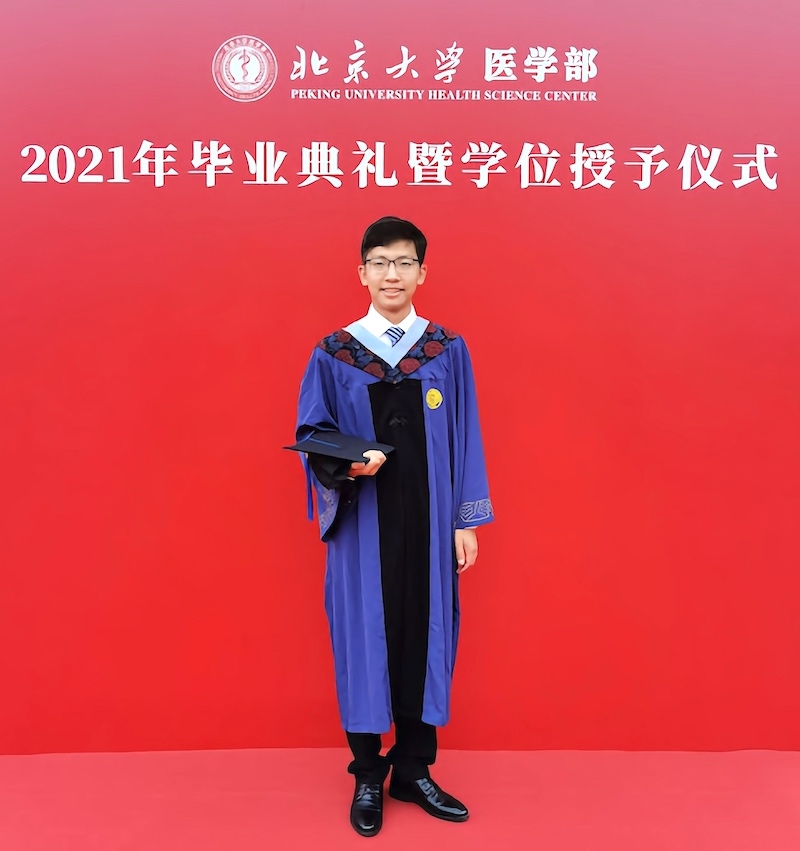
Master’s degree ceremony: Peking University, Beijing, China, Summer 2021
How has the transition from MSc in PKUHSC to OTD been?
China and the United States have very different cultural backgrounds. This ranges from the perspective of OT education, the way of communication between people, the atmosphere of class and work, and the pace of life here are all different from before. It has basically been like learning how to grow up and live again. Fortunately, I quickly adapted to the lifestyle and study context here. For the first semester, I am working with Dr. Emily Sopkin and Dr. Shawn Roll separately for pedagogy and research. Now I can actively act as a mentee.
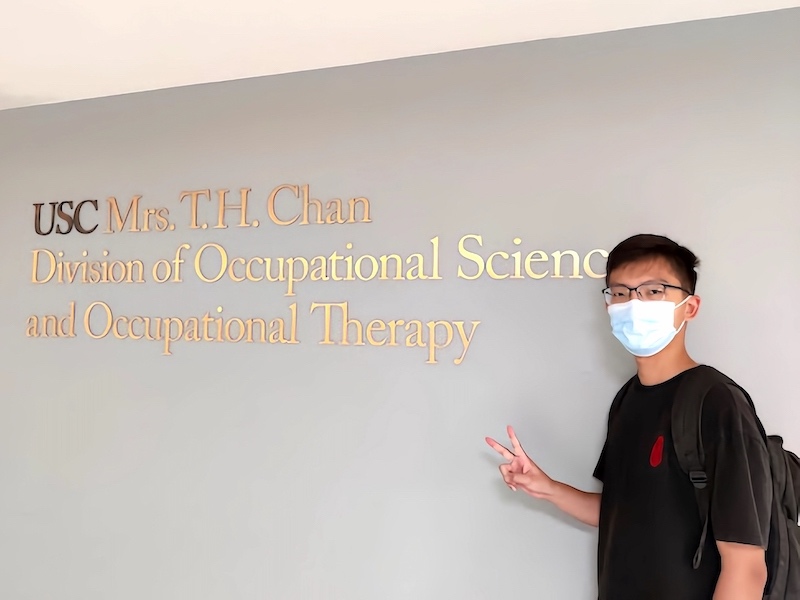
Chen’s First photo with USC Chan Division, Fall 2021
Describe your experience of OT school at PKUHSC vs USC.
Studying OT in PKUHSC for two years was really a very good experience. We completed the Master’s courses required by USC, and the way of teaching at PKUHSC was similar to USC Chan’s classes. In addition to the courses, we all completed a certain research project and published a paper in Chinese core journals. Through this, I have special appreciation for my mentor, Professor Ninghua Wang and her support for my research work. I also really appreciate my instructors Dr. Jane Liu, Dr. Liguo Qian, Dr. Hui Wang, Dr. Lily Xu and Dr. Buwen Yao, who were all students of USC Chan, and their efforts to localize these OT courses. Studying OT at USC is exciting. I can feel leadership everywhere. This immersion allowed me to think about how to develop my leadership. The Chan Division has its own unique experience in pedagogy, research, and clinical practice. I am sure I can learn something different from what I learned in PKUHSC, especially in clinical practice.
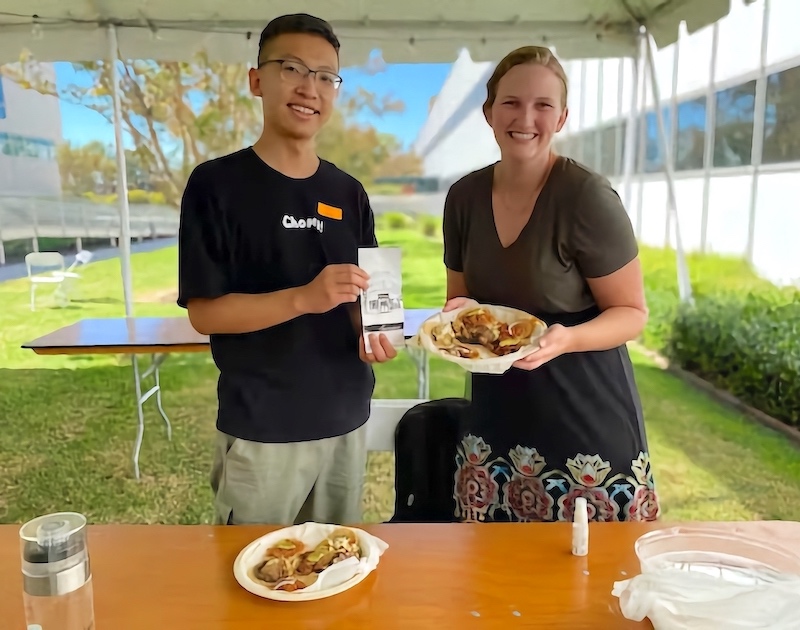
Unforgettable lunch with Dr. Emily Sopkin, Fall 2021
What do you think about your OTD residency so far?
It’s great! My residency for the first semester is mainly about pedagogy and research.
For my pedagogy residency I am a teaching assistant for OT 440: Kinesiology, which was also my favorite class when I was a Master’s student at PKUHSC. I enjoy this job. I developed a good mentoring relationship with Dr. Sopkin. I try to be creative by sharing knowledge related to the course with my students to help them learn from different perspectives.
For research, I’m working in the Musculoskeletal Sonography and Occupational Performance (MSOP) laboratory. Now I am gradually getting involved in existing research in the lab, which makes me feel fulfilled. As Dr. Roll said, “I don’t think it’s that important for you to learn a particular skill. It’s more important to immerse yourself in the research environment and see how research works.” I couldn’t agree more.
What kind of OT do you want to be in the future? Your plans/goals after OTD graduation? Or how will you promote OT services in China?
Actually, I want to be an active OT, who is purposeful, has great leadership skills and knows how to promote OT effectively. I also hope that I will be good at several clinical skills, which will help me establish my professional identity.
I plan to work in the OT department of a general hospital, mainly engaged in the occupational therapy of musculoskeletal and neurological disorders of the upper limbs and hands, and also undertake part of the teaching work, e.g. combining what I learned here with China’s clinical context and then trying to establish a practical framework of occupation-based hand therapy education. As for research, I will try to design and lead research projects and apply for national funding.
⋯

Dancing In the Rain ⟩
September 15, 2021, by Teresa
Fieldwork What are OS/OT?
In the Vietnamese language, there is a phrase to offer your condolences to someone when a loved one passes — “chia buồn” — which roughly translates to, “I share in your sadness.” I’ve always found it poignant and have yet to find a phrase in English which can succinctly convey the same sentiment; that if the weight feels too much for one person to bear, please allow me to help you carry it.
This past summer, my grandpa passed away, peacefully and surrounded by loved ones after many years of suffering many strokes. Recounting his life, I realized I had known him as ill for more years of my life than I had not. Growing up, most of my interactions with him existed within the confines of a skilled nursing facility. This past summer, I was also completing my first Level II fieldwork experience in a skilled nursing facility.
During his celebration of life, my family went around the room sharing stories about grandpa. After my dad retired, he took upon the role as an informal caregiver to my grandpa and shared how much grandpa hated my dad’s visits to the nursing facility because he knew that meant it was time for a bath. My mind went, “OT!” but everyone took the light-hearted story for what it was and laughed, including myself. A few weeks later during fieldwork, I was notified that a family member wanted my patient to work on bathing during OT that day.
My patient did not want to work on bathing during OT that day.
They were protesting against the task, bargaining with me, and apologizing for how their disability was inconveniencing my work. I thought of my grandpa and how I would want a therapist to approach the situation if it was him. In places like skilled nursing facilities, there is so much loss of control. People have little to no control in their routine, what and when to eat, what medications they take, and how quickly (or slowly) their body is changing. So when a bright-eyed young OT student comes knocking on their door, asking if they want to take a bath, they say “no” — and you let them, because it returns just a tiny sliver of control to their life.
On several occasions, concerned family members entered the rehab gym with questions about their loved one’s progress during therapy. While others avoided eye contact so as not to get flagged down with questions, I’d approach them and provide updates as best I could. Afterwards, therapists would say to me, “You’re a student — you didn’t have to do that” to which I would reply, “I wanted to.” Just as much as I want to share in victories with patients and their families, I want to share in their sadness with them as well because it’s how I would want my own loved ones to be treated by providers.
Dr. Rafeedie often says how “occupational therapists teach people how to dance” but I’d like to add a stipulation — that sometimes, we teach people how to dance in the rain. That sometimes, in even the bleakest of places, you can teach people how to flip their outlook on life, flip the way they move and feel, and flip the way the system works because as occupational therapists, you’re well-equipped to. OTs possess the impeccable ability to take an unfortunate situation and turn it into something wonderful.
I lost my grandpa this summer yet somehow, I still saw him a lot. I saw him through my patients and the cheesy jokes they’d crack during our sessions. When they encouraged me to work hard in school and finish strong, I heard my grandpa cheering me on. On their families’ faces, I saw my own family’s faces — the looks of desperation, of encouragement, of sorrow, of hopefulness. To whoever is reading this with a heavy heart: I share in your sadness with you, whatever it may be. The rain is clearing and the sunshine is coming, I can feel it. Let’s dance.
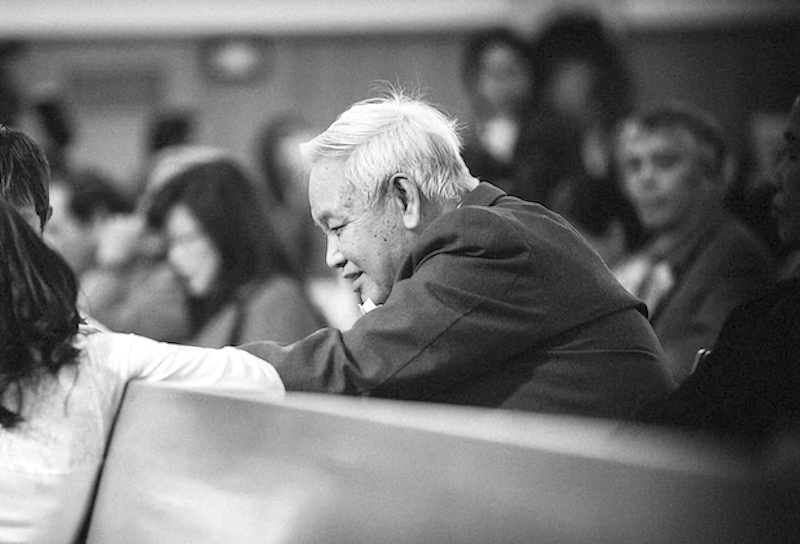
In loving memory of Thomas Dương Đức Thanh
⋯

All roads lead to OT ⟩
September 8, 2021, by Alyssa
Admissions What are OS/OT?
The first time I heard the phrase “occupational therapy” I was standing in the freshman dorm room of my future best friend (+ former Chan student ambassador) Noelle; I had just moved in down the hall. She told me about the BS-MA program, and I thought, that’s cool and then did not think about OT again for 2 years.
—
That’s the simple start to my messy story answering the question “Why OT?” I think of it as driving down 3 roads at the same time. To help navigate, I’ve included some illustrations.
Road 1: Academic Life
While media studies and OT may seem unrelated, this road was the most direct.
Freshly graduated from a media-focused vocational high school, I was excited to don my new hat as a student at the USC School of Cinematic Arts. Several of the classes for my Media Arts + Practice major focused on media ethics and the impact of technology on daily life, which built my interest in the use of media outside of the entertainment industry. I had a particular interest in media for healthcare and bounced around between a few different minors to explore this intersection. When I ultimately declared my occupational science (OS) minor, I knew I had found the perfect way to combine my interests in both arts and healthcare. For my undergraduate senior thesis, I prototyped an assistive device designed to help parents practice self regulation strategies with their children.
In the year following, I completed my OT school prerequisites and applications while pursuing my MA in Media Arts, Games, and Health. A natural transition between media and OT studies, I sharpened my research skills and broadened my understanding of technology use/gaming as an occupation.
On this road, I ignited my interests in interdisciplinary research and excitement for OT studies.
Road 2: Work Life
I’ve always been a bit of a workaholic. So, on top of all that school, I spent my extracurricular time trying on a bunch of careers.
I spent my freshman and sophomore years dream hopping from film editor to TV producer to website coder to themed entertainment designer. I worked intense hours at USC’s student TV station and explored my interests further with internships at a news station and a science museum. These were all incredibly interesting experiences, but none of them felt right for me.
In the off season, for 5 summers, I worked as a camp counselor at my local parks system. In my 6th summer, I transitioned into the therapeutic recreation division, providing one-to-one support for children with disabilities on general day camps. These were the first jobs that showed me that going to work doesn’t have to feel like work. The only other job I felt this way about was teaching Zumba at the USC gym.
On this road, I realized the commonality between jobs I truly enjoyed was forming connections and making a direct, meaningful impact on others.
Road 3: Personal Life
In the same semester that I declared my OS minor, I was supporting a loved one through rehabilitation following emergent open heart surgery. As I stayed involved in their recovery, I noted how their re-engagement in meaningful occupations, such as returning to work or playing basketball again, were what gave them and our family a sense of hope among the hardships. It was just like what I learned in my OS minor courses — that holistic healthcare is about more than survival.
I have also had exposure to the patient perspective through my experiences with chronic illness. After years of doctor’s appointments, I’ve seen the kind of provider I want to be — one that emphasizes the practices of listening, patience, empathy, and advocacy.
On this road, I saw the power of meaningful occupations and found my passion for providing individualized care.
—
If I could go back in time to my first conversation with Noelle and tell myself to look into/pursue OT right away, I wouldn’t. The non-traditional path was the way for me.
That being said, it feels nice to keep my eyes on one road now. Can’t wait to see where it goes.
⋯







